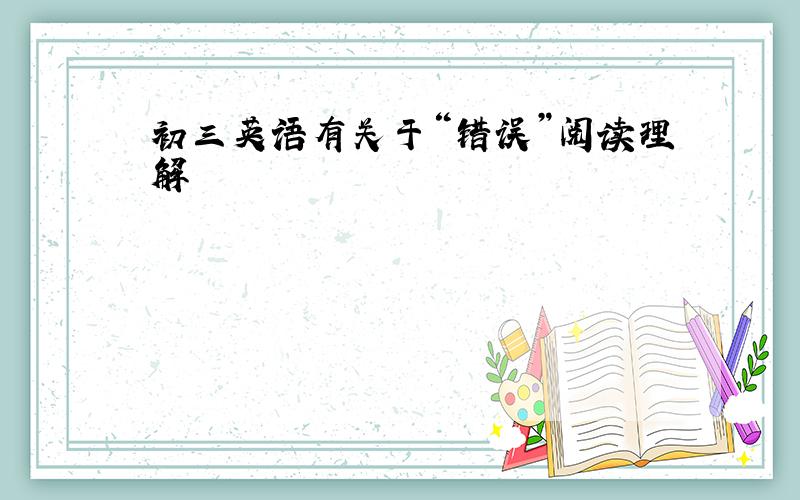初三英语有关于“错误”阅读理解
来源:学生作业帮 编辑:百度作业网作业帮 分类:英语作业 时间:2024/05/12 16:21:03
初三英语有关于“错误”阅读理解
17号月考英语!老师透露了点试题!说是有关于“错误”的!就说了这么多、我们很高兴、他说我们绝对找不到这题目的、我不信!利用伟大的互联网的力量!朋友们、帮帮忙吧.初三上学期英语阅读理解、内容是有关于“错误”的.就知道这么多.
17号月考英语!老师透露了点试题!说是有关于“错误”的!就说了这么多、我们很高兴、他说我们绝对找不到这题目的、我不信!利用伟大的互联网的力量!朋友们、帮帮忙吧.初三上学期英语阅读理解、内容是有关于“错误”的.就知道这么多.

We can make mistakes at any age. Some mistakes we make are about money. but most mistakes are about people. "Did Jerry really care when I broke up with Helen?" "When I got that great job, did Jim, as a friend, really feel good about it? Or did he envy my luck?" "And was Paul friendly just because I had a car?" When we look back, doubts like these can make us feel bad.
But when we look back, it is too late.
Why do we go wrong about our friends, or our enemies? Sometimes what people say hides their real meanings. And if we do not really listen, we miss the feeling behind the words. Suppose someone tells you, "You're a lucky dog!"(你真幸运!) Is he really on your side? If he says, "You're a lucky guy(人,家伙)!", that is being friendly. But "a lucky dog?" There is a bit of envy in those words. What he may be saying is that he does not think you deserve your luck.
"Just think of all the things you have to be thankful for" is another phrase that says one thing and means another. It could mean that the speaker is trying to get you to see your problem. But this phrase contains the thought that your problem is not at all important.
How can you tell the real meaning behind someone's words? One way is to take a good look at the person talking. Do his words fit the way he looks? Is what he says shown by the tone of voice? The look in his eyes? Stop and think. The minute you spend thinking about the real meaning of what people say to you may save your another mistake.
1.When the writer recalls(回想) some of the things that happened between him and his friends, he _______.
A.feels happy, thinking how nice his friends were to him
B.feels he might not have understood his friends' true feelings
C.think it a mistake to have broken up with his girl friend
D.is sorry that his friends let him down
2.When the writer talks about someone saying, "You're a lucky dog!", he is saying that ______.
A.the speaker is just friendly
B.this sentence suggests the same as "You're a lucky guy!"
C.the word "dog" should not be used to apply to people
D.sometimes the words show that the speaker is a bit envious
3.This passage tries to tell you how to ______.
A.avoid(避免) mistakes about money and friends
B.get an idea of friendly people
C.avoid mistakes in understanding what people tell you
D.keep people friendly without trusting them
4.The writer suggests that ______ be trusted.
A.everybody B.nobody C.all the people D.not all the people 1.B 2.D 3.C 4.D
But when we look back, it is too late.
Why do we go wrong about our friends, or our enemies? Sometimes what people say hides their real meanings. And if we do not really listen, we miss the feeling behind the words. Suppose someone tells you, "You're a lucky dog!"(你真幸运!) Is he really on your side? If he says, "You're a lucky guy(人,家伙)!", that is being friendly. But "a lucky dog?" There is a bit of envy in those words. What he may be saying is that he does not think you deserve your luck.
"Just think of all the things you have to be thankful for" is another phrase that says one thing and means another. It could mean that the speaker is trying to get you to see your problem. But this phrase contains the thought that your problem is not at all important.
How can you tell the real meaning behind someone's words? One way is to take a good look at the person talking. Do his words fit the way he looks? Is what he says shown by the tone of voice? The look in his eyes? Stop and think. The minute you spend thinking about the real meaning of what people say to you may save your another mistake.
1.When the writer recalls(回想) some of the things that happened between him and his friends, he _______.
A.feels happy, thinking how nice his friends were to him
B.feels he might not have understood his friends' true feelings
C.think it a mistake to have broken up with his girl friend
D.is sorry that his friends let him down
2.When the writer talks about someone saying, "You're a lucky dog!", he is saying that ______.
A.the speaker is just friendly
B.this sentence suggests the same as "You're a lucky guy!"
C.the word "dog" should not be used to apply to people
D.sometimes the words show that the speaker is a bit envious
3.This passage tries to tell you how to ______.
A.avoid(避免) mistakes about money and friends
B.get an idea of friendly people
C.avoid mistakes in understanding what people tell you
D.keep people friendly without trusting them
4.The writer suggests that ______ be trusted.
A.everybody B.nobody C.all the people D.not all the people 1.B 2.D 3.C 4.D